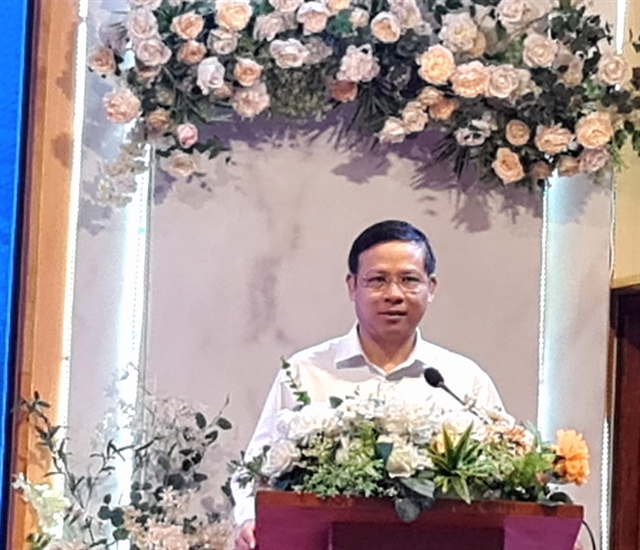.jfif) Opinion
Opinion

 |
| Nguyễn Sơn Hải, director of the Ministry of Education and Training (MoET)’s Information and Communication Technology Department. — VNA/VNS Photo |
Nguyễn Sơn Hải, director of the Ministry of Education and Training (MoET)’s Information and Communication Technology Department spoke with the Vietnam News Agency about the positive outcomes achieved in the education sector after more than a year of enhancing the application of information technology and digital transformation for the 2022-2025 period.
Could you tell us about the initial results of the project to enhance the application of information technology and digital transformation?
The project of enhancing the application of information technology and digital transformation in education and training for the 2022 - 2025 period, with a vision towards 2030, holds significant importance for the education sector in realising Resolution 29 of the Central Party Committee on comprehensive education reform. In recent times, the education sector has made diligent efforts to implement this project and has achieved some initial results.
First and foremost, the education sector has built the database for the entire education system. Since 2018, the MoET has been developing this database, covering from preschools to high schools. In June, for the first time, a university-level database was established.
In line with the Government's Project 06 on developing a national population database, the MoET has been proactive in completing the digitised data for the education sector. The MoET established a connection with the national population database in 2022. Subsequently, the verification of citizen identity numbers and all educational levels was carried out.
Furthermore, the education sector has been providing information related to education and training to enrich the national population database. Conversely, the national population database supplies administrative-related information. Over the past year, the national population database has provided the education sector with the permanent residence history of candidates for determining priority status in admissions for students.
In alignment with the Government's policy of verifying permanent residence history prior to administrative procedures and urgent situations, the MOET has been utilising the sector's database to facilitate administrative procedures for students. Specifically, 12th-grade students now register for the high school graduation examination entirely online, yielding administrative efficiency and saving time for both students and schools.
Built upon the foundation of the education sector's database and connected to the national population database, we have clean, human-centric data to streamline administrative procedures, which greatly benefits the general population.
Currently, there are still units in the education sector that do not fully understand digital transformation. This has led to incorrect or passive implementation of related tasks. What is the role of the MoET in addressing these challenges?
In accordance with the Prime Minister's Decision 131, the MoET has issued directives to other ministries, provinces, and cities to provide guidelines on the implementation of information technology and digital transformation tasks. These guidelines include key and prioritised tasks, such as enhancing awareness about digital transformation among the educational workforce, including teachers, educational administrators, and staff to improve their digital skills.
The MoET and local departments of education and training have organised conferences and seminars related to digital transformation. Annually, the MoET conducts a national digital transformation conference in the education sector. This event serves as an opportunity for us to assess the situation, implement digital transformation at the grassroots level, and enhance awareness among educators, administrators, and staff.
However, in practice, there are still units and individuals who do not fully comprehend digital transformation. Addressing this issue requires continuous and long-term effort. We are committed to collaborating with units to continually raise their awareness so that they can see the benefits of digital transformation.
What models and solutions will the MoET, as well as educational institutions, rely on to achieve the sector's digital transformation goals in the near future?
The precursor to digital transformation is the application of information technology, focusing on utilising digital technology in specific tasks. However, digital transformation requires a comprehensive approach. It can even involve ultimately changing work models to be based on digital transformation.
In the education sector, various levels of digital transformation models are being implemented. Specifically, the MoET has been building an education sector database since 2018. To date, the entire sector has gained awareness and implemented consistent approaches from the grassroots to the central level.
In the realm of general education, we have established online learning models. When the COVID-19 pandemic emerged, schools suddenly shifted to online teaching. In response, the MoET promptly issued policies to promote online teaching. Online education has become the primary mode of education, even in normal conditions.
We are currently developing online teaching models that are suitable for normal conditions. These models require changes through Learning Management Systems (LMS), where teachers can interact with students and assign tasks. Students can participate before, during, and after lessons. The MoET is also working with universities to create a digital university model with the aim of promoting digital transformation in higher education.
Especially, there is a focus on digital transformation in higher education training. We are building a shared platform for online education. Universities will create online courses, which will then be standardised, shared, and mutually recognised. For example, a student from University A can take a course at University B and receive credit recognition. These are the digital transformation models in higher education that we aim to promote for practical and effective implementation in the sector. — VNS




